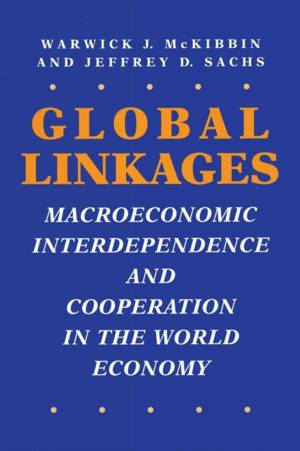
- Afhalen na 1 uur in een winkel met voorraad
- Gratis thuislevering in België vanaf € 30
- Ruim aanbod met 7 miljoen producten
- Afhalen na 1 uur in een winkel met voorraad
- Gratis thuislevering in België vanaf € 30
- Ruim aanbod met 7 miljoen producten
Zoeken
Global Linkages
Macroeconomic Interdependence and Cooperation in the World Economy
Warwick J McKibbin, Jeffrey D Sachs
Paperback | Engels
€ 44,45
+ 88 punten
Omschrijving
With the rapid deterioration of the U.S. trade balance in the 1980s, the United States was forced to finance deficits by borrowing heavily from the rest of the world. In doing so, the United States went from being the world's largest creditor country to the world's largest debtor, while Japan and West Germany experienced a rise in trade surpluses. Such a shift in international trade flows has had profound effects on the world economy. McKibbin and Sachs address a range of issues involving macroeconomic imbalances in the world economy. Through the use of a new simulation model of the world economy they explore how policy actions undertaken in one country affect the trade flows and macroeconomic patterns among the other counties. The authors show that key macroeconomic features of the 1980s can be explained by shifts in monetary and fiscal policies in the major economies and by supply shocks due to changes in oil prices. In addition to showing how the global macroeconomic experience can be understood, they focus on a number of current policy issues, including the reduction of global trade imbalances, the consequences of U.S. fiscal consolidation, the effects of an oil price shock, the implications for the U.S. economy of increases in Japanese and German fiscal spending, the effects of targeting exchange rates among the major currencies, and the gains of increased coordination of macroeconomic politics among the major economies. In several cases, their conclusions are shown to be quite different from those that form the basis of many conventional views. The authors also analyze the importance of interaction between policymakers in industrial economies and conclude by reemphasizing the need for U.S. politicians and policy experts to recognize that macroeconomic results in the U.S. now depend heavily on events abroad.
Specificaties
Betrokkenen
- Auteur(s):
- Uitgeverij:
Inhoud
- Aantal bladzijden:
- 296
- Taal:
- Engels
Eigenschappen
- Productcode (EAN):
- 9780815756019
- Verschijningsdatum:
- 1/06/1991
- Uitvoering:
- Paperback
- Formaat:
- Trade paperback (VS)
- Afmetingen:
- 153 mm x 229 mm
- Gewicht:
- 362 g

Alleen bij Standaard Boekhandel
+ 88 punten op je klantenkaart van Standaard Boekhandel
Beoordelingen
We publiceren alleen reviews die voldoen aan de voorwaarden voor reviews. Bekijk onze voorwaarden voor reviews.







